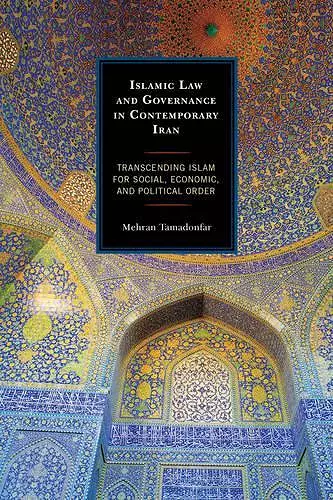Islamic Law and Governance in Contemporary Iran
Transcending Islam for Social, Economic, and Political Order
Format:Paperback
Publisher:Lexington Books
Published:23rd May '17
Currently unavailable, and unfortunately no date known when it will be back
This paperback is available in another edition too:
- Hardback£119.00(9781498507561)

The current rise of Islamism throughout the Muslim world, Islamists’ demand for the establishment of Islamic states, and their destabilizing impact on regional and global orders have raised important questions about the origins of Islamism and the nature of an Islamic state. Beginning with the Iranian revolution of the late 1970s and the establishment of the Islamic Republic to today’s rise of ISIS to prominence, it has become increasingly apparent that Islamism is a major global force in the twenty-first century that demands acknowledgment and answers. As a highly-integrated belief system, the Islamic worldview rejects secularism and accounts for a prominent role for religion in the politics and laws of Muslim societies. Islam is primarily a legal framework that covers all aspects of Muslims’ individual and communal lives. In this sense, the Islamic state is a logical instrument for managing Muslim societies. Even moderate Muslims who genuinely, but not necessarily vociferously, challenge the extremists’ strategies are not dismissive of the political role of Islam and the viability of an Islamic state. However, sectarian and scholastic schisms within Islam that date back to the prophet’s demise do undermine any possibility of consensus about the legal, institutional, and policy parameters of the Islamic state. Within its Shi’a sectarian limitations, this book attempts to offer some answers to questions about the nature of the Islamic state. Nearly four decades of experience with the Islamic Republic of Iran offers us some insights into such a state’s accomplishments, potentials, and challenges. While the Islamic worldview offers a general framework for governance, this framework is in dire need of modification to be applicable to modern societies. As Iranians have learned, in the realm of practical politics, transcending the restrictive precepts of Islam is the most viable strategy for building a functional Islamic state. Indeed, Islam does provide both doctrinal and practical instruments for transcending these restrictions. This pursuit of pragmatism could potentially offer impressive strategies for governance as long as sectarian, scholastic, and autocratic proclivities of authorities do not derail the rights of the public and their demand for an orderly management of their societies.
The apparent durability of the Islamic Republic of Iran has surprised and dismayed most Western observers. Tamadonfar’s comprehensive study of the nation’s recent history, politics, and law reveals a surprisingly dynamic and complicated struggle for dominance between sharply divergent conceptions of the meaning of Islamic law and its role in the exercise of power. Though at its core a theocratic-military regime, actual power has shifted among competing factions in the military, parliament, the presidency, the courts, economic and social elites, and the Ayatollah-led governing councils. Religion has served as much as a political artifact for these competing factions as it has been a defining goal. Tamadonfar argues that 'growing marginalization of Islamic precepts and republican dimensions of the constitution, along with government failures to meet the needs of the public, could conceivably undermine the legitimacy of the Islamic Republic.' And the effects of the recent attenuation of Western sanctions are difficult to predict. But for anyone seriously trying to unravel these complicated issues, this book provides a necessary starting point. It should also serve properly to warn all students of Islam how complicated the idea of an 'Islamic state' actually is. Summing Up: Recommended. Upper-division undergraduate, graduate, and research collections. * CHOICE *
This painstakingly researched work clearly traces the development of Islamic jurisprudence from their roots in pre-Islamic societies through to modernity, using today’s Iran as a case study. This well-written book is a timely, must read volume for any serious student of law and Middle-East politics at large. -- Tareq Ismael, University of Calgary
For some, the fact that Islamic law remains socially and politically relevant throughout the Islamic world is a cause for concern, while for others it is a confirmation that the secular path of political development is not inevitable. In this theoretically rich and theologically informed book, Mehran Tamandonfar provides a much needed framework for understanding the nuances and complexities of this process. Using the Islamic Republic of Iran as a case study, Tamandonfar examines the dynamic process by which religious and political elites both use and abuse the Islamic legal tradition. His book offers a powerful corrective to those who contend that Islam is incompatible with democratic institutions and practices, while at the same time acknowledging that only a dynamic, open-ended, and pragmatic approach to the Islamic worldview is capable of such a rapprochement. This invaluable book offers a comprehensive analysis of an issue of great political significance. -- Chris Soper, Pepperdine University
This substantial piece of scholarship represents a genuine contribution to the literature in the way it combines in one place a precisely crafted review of Iranian constitutional specifics while also providing careful attention to political change and contemporary policy disputes with western countries. There is no recent volume that does so as successfully or that treats these issues with the detailed care and nuance the author here supplies. Tamadonfar provides a genuine service to the scholarly community by developing in great detail the structure and past and current functioning of the constitution and political life of the Islamic Republic of Iran. -- Joseph Prud'homme, Director, Institute for Religion, Politics, and Culture, Washington College
ISBN: 9781498507585
Dimensions: 227mm x 153mm x 28mm
Weight: 558g
410 pages